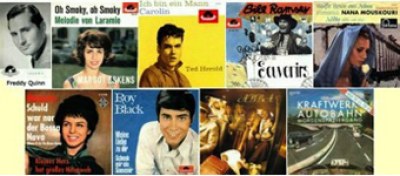人文学部ゼミブログ

2011.06.30
- 人文学部
- ヨーロッパ文化学科
現代ドイツ文化演習1(ライニ・シュヴェーデ)
下の文章はドイツのポップ・ミュージック(Schlager)を扱うゼミについてシュヴェーデ先生が英語で書かれたものです。
シュヴェーデ先生の授業では、旧東ドイツと西ドイツの違いを中心に、音楽や映像を通して、時代や社会を写す鏡としてのポップ・ミュージックに触れることができます。 もともと旧西ドイツのポップソングには当時の政治・社会情勢を歌ったものが多かったようですが、次第に国際化し、「Denglish」と呼ばれる混合言語が使われるようになります。旧西ドイツでは1950年代初頭から多文化的傾向が見られたいっぽう、旧東ドイツでは西側諸国の文化がタブー視されていたこともあり、単一文化の閉じられた世界が長く続きました。旧東ドイツ地域では、伝統的ドイツ語が国際化することなく歌い続けられてきたのです。
皆さんの知っている現在の「ドイツ」は統一後の「ドイツ」ですが、こんなふうにヒットソングから、東西に分断されていた時代の歴史や文化を学ぶことのできるゼミもあります。「Heimat」や「Verboten」がドイツ語でどんな意味を持つのかに注意しながら、シュヴェーデ先生の原文を読んでみてくださ い。(ちなみに「Zeitgeist」は「時代精神」、「Wanderlust」は「放浪癖」を指すドイツ語起源の言葉です。)
英語英米文化学科准教授 岩佐 愛

German pop music seems to be a brilliant mirror of German society and its changes from the Golden Fifties up to the present. The focus in the summer semester is on the different approaches that East and West Germany`s so called Schlager – the German equivalent for the English hit songs – have to reflect post war developments in those societies. Each week one topic is presented in two or three songs. Thanks to YouTube students are not only able to listen to the original music but to get an impression about what was “in” in looks and style of the period.

A common denominator seems to be presented in pop music in the West, reflecting the general Wanderlust known to German culture throughout history: the longing for a different kind of life, lifestyle in exotic settings. In the West, Schlager mirrors not only political and social topics, but also society’s opening to the Western way of life, multiculturalism, or, as it’s called in German: Multikulti, predominant since the early fifties until today. “Test the West” is the motto in songs, culture, society in general.
This trend was tabooed in the East for more than 40 years of its existence. To touch on economic or political shortcomings of the socialistic society was strictly forbidden; offenders had to bear grave consequences like expatriation or even incarceration. Consequently forbidden is the praise for any foreign country and its cultural assets (but socialistic ones). Schlager music centred on love and beauty of the East German “Heimat”, loosely translatable to homeland, ideally in combination. Western pop in general, American especially, was VERBOTEN, which had more often than not the effect that courageous citizens turned their radios to Western (German) frequencies – and provided lots of room for black market entrepreneurs selling Western pop for horrendous prices to East German fans. In short: East German Schlager music reflects the “uni-cultural”, closed in view on its society, on the world in general, which was favoured by the political leadership. The nonexistence of multiculturalism as a philosophy and as a factor in daily life is the reason that German as a language has remained pure, uninfluenced by a foreign language invasion, unlike in the West. Until today traditional German is the main communication language and consequently the main Schlager language in the East. The New German Wave, rolling in from the East to the West has made German a hit language in the reunified New Germany and qualifies for many Westerners as a new kind of cultural invasion.
